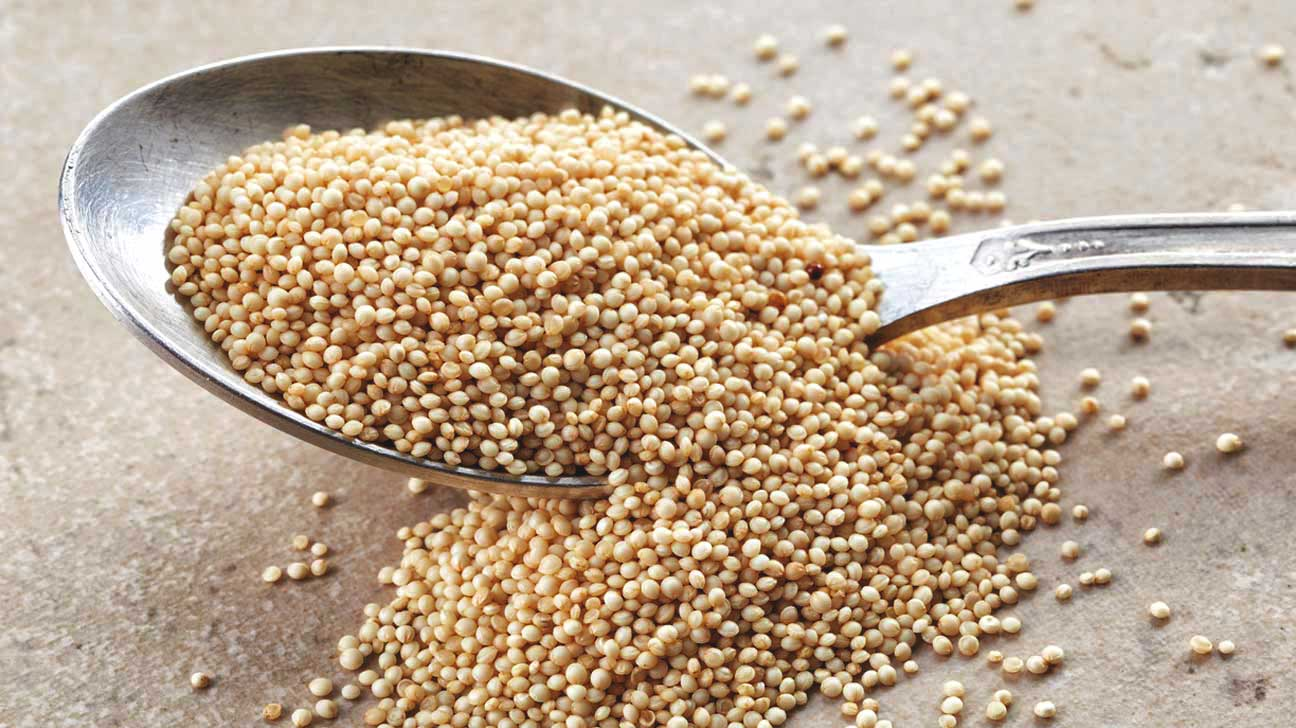What is Amaranth?
Amaranth or amaranthus caudatus is cultivated as a leaf vegetable and ornamental plant. Although it falls into the grain category, as it is consumed and cooked like rice, it is a pseudo cereal. It was first grown by the Aztecs and represented about 80% of their caloric consumption.

Amaranth is a very tiny yellow seed and has an earthy and nutty flavor. It can be cooked and served with salads, bowls and hot dishes, but it can also be popped, making it a perfect snack or ingredient for bread crumbs. For overall nutrition, amaranth supersedes many of the popular grains because of the immense health benefits it carries.
Benefits of Amaranth
1. Amaranth Contains Antioxidants
Amaranth provides an abundant amount of antioxidants, which are molecules that help fight free radicals in the body. Free radicals are produced when your body breaks down food or when you're exposed to tobacco smoke or radiation.
It is particularly high in phenolic acids such as gallic acid, p-hydroxybenzoic acid and vanillic acid–which help protect against diseases such as heart disease, cancer, etc.
2. Amaranth May Help Improve Your Digestive Health
This pseudo-grain is an excellent source of fiber. One cup of amaranth has 20 grams of dietary fiber. The recommended intake of dietary fiber for men and women is 25 and 38 grams respectively. Dietary fiber may help prevent constipation, making your bowel movements easier to manage.
Because amaranth is a source of insoluble fiber, it does not dissolve in water. This also means that the fiber helps regulate the excretion of wastes due to the inability to absorb amaranth; it passes through the digestive system and takes toxins, waste and other material out of your gut.
3. Amaranth Can Help You Build Stronger Bones
Did you know that about 99% of consumed calcium is stored in your bones and teeth? This mineral plays a vital role in building stronger, healthier bones earlier in life and keeping them strong and healthy later in life.
One cup of uncooked amaranth has 240mg of calcium. Most adults require at least 1000mg of calcium per day to prevent osteoporosis and other bone related diseases.

4. Amaranth Can Help Alleviate PMS Symptoms
One cup of cooked amaranth contains 105% of the Recommended Dietary Intake of the mineral manganese. A study published in the American Journal of Obstetrics and Gynecology suggested that taking magnesium with calcium could help improve menstrual symptoms such as pain, depression, mood swings and irritability.
The study was conducted on 10 women with normal menstrual cycles who completed a questionnaire during each cycle of the 169-day period. Calcium and manganese nutrition varied every 39 days.
Increasing calcium intake reduced mood, concentration and behavior symptoms. Furthermore, when dietary manganese was lowered, participants experienced increased mood and pain symptoms during the pre menstrual phase.
Clearly dietary calcium and manganese have an important role in the treatment of menstrual distress.
5. Amaranth Can Help Prenatal Babies Develop Properly
Amaranth also contains ample amounts of B-vitamin complex such as folate. Folate plays a role in neural tube formation and red blood cell formation in newborn babies. Amaranth intake during pregnancy can be a great way to ensure you are eating enough folate.
A deficiency of folic acid in pregnant women can lead to the birth of underweight infants and may also result in neural tube defects in newborns.

6. Amaranth Can Help Protect Your Nervous System
Vitamins such as folate also play a significant role in the regulation of specific amino acids that the nervous system requires. Studies have shown that an insufficient amount of dietary folate can increase homocysteine levels, which can be a dangerous precursor to neurodegenerative diseases like Alzheimer's and Parkinson's disease.
One cup of amaranth contains 40% of the recommended daily intake of folate. Additionally, one cup of amaranth contains 15% of the recommended daily intake of thiamine. Thiamine ensures smooth functioning of the brain and helps ensure memory and concentration. Thiamine also helps relieve stress and strengthen the nerves.
7. Amaranth Can Increase Your Body's Oxygen Levels
Copper and iron are essential for the formation of new blood cells. One cup of amaranth contains 82% of the daily recommended value of iron and 51% for copper. A deficiency of iron can lead to anemia.
Iron deficiency anemia can cause fatigue, weakness and pale skin. Because amaranth is an iron-rich food, it can help you avoid suffering from low iron levels.
Amaranth Recipe Ideas
While a serving of Amaranth can be eaten on its own, combining this versatile superfood with other ingredients can make it much more delicious.
Here are some ideas to get you started:
Amaranth with cherries and walnuts
Combine amaranth, milk, salt and spices together in a sauce pan until the amaranth is cooked. Sweeten to taste and serve with your desired toppings! This makes for a comforting and nutritious breakfast.

Popped amaranth
This one is very simple, just like making popcorn. All you need to do to pop is heat the pan, add the seeds and let it pop. This makes a perfect snack to have any time of the day!

Amaranth patties
Combine red lentils, cooked amaranth, green onion, cumin and other spices of your choice in a bowl. Form the patties, pan fry them in a skillet and enjoy these delicious plant-based patties on their own or with burger buns.

Want to Learn How Diet Can Help You Achieve Your Fitness Goals?
Join the Invasion!
This Anabolic Aliens membership will grant you access to workout classes, rehab programs, diet plans, and more exclusive content to help you achieve sustainable success!










